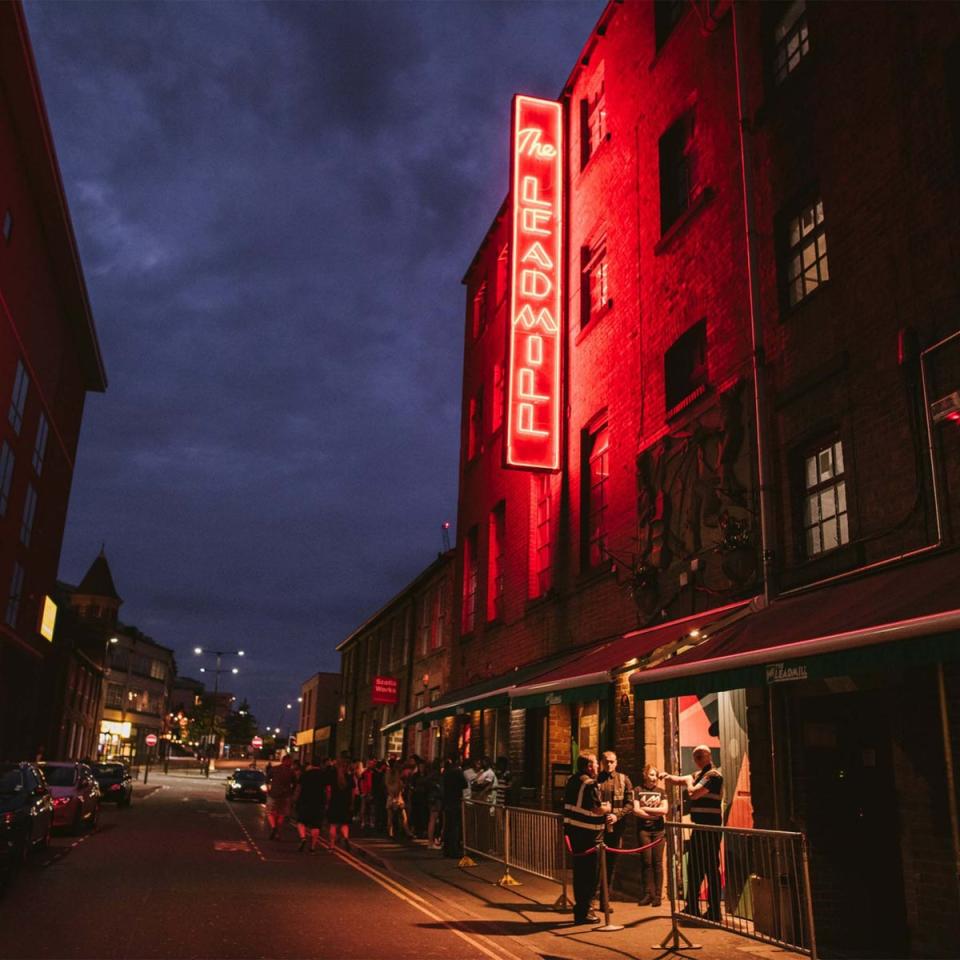‘If they win, I will never set foot over the threshold again’: The battle for The Leadmill, Sheffield’s most famous music venue

The time has come to say goodbye,” Richard Hawley informs the crowd, as he closes his four-night residency at The Leadmill, Sheffield. The packed room is bathed in a red glow, casting strange silhouettes across the black-painted walls. Those walls have seen a lot. They’ve seen Hawley play hundreds of times – more than any other artist – and hundreds more fans hypnotised by his rich, velvety voice. Yet his farewell tonight is particularly poignant. Not only is this the end of a great gig; it’s soon to be the end of The Leadmill as we know it.
As an independent music venue, The Leadmill has played a pivotal role in the careers of some of our most celebrated rock artists. A former community centre that opened in 1980 in place of The Esquire (a Sixties club visited by Jimi Hendrix), it’s where Hawley got to practise his crooning rock’n’roll, as smooth and satisfying as a perfectly pulled pint of Guinness. It’s also where Pulp played their first run of gigs, and where Arctic Monkeys sold out shows in record time back in 2005. Amy Winehouse, Elliott Smith and The Stone Roses (the latter at £1 per ticket) have all performed there. It’s the beating heart of the city, steeped in history.
So why does that have to change? In March this year, the venue’s managers announced the “devastating” news that their landlord was planning to evict them in 12 months. The Brixton-based Electric Group purchased the property under the name Glenburn Properties in 2017, later changing the name and describing itself as “an independent, fast-growing and privately owned music venues company”. It owns several other locations around the country – including Electric Brixton, SWX in Bristol, and the O2 Academy in Newcastle – but a source close to the company says it is not part of a bigger music group or allied to a particular promoter. Representatives for Electric Group have insisted that The Leadmill will be maintained as a music venue – albeit under a new name and new management.
“Being truly independent is so important to so many venues, and is what allows them to put on artists they believe in, especially early on in their careers,” argues Sybil Bell, founder of Independent Venue Week. “Independent venues and artists are such a huge part of the authenticity of the community.” During the filming of the BBC documentary On the Road with Independent Venue Week, Bell visited The Leadmill and observed how the people working there “are not only passionate about the venue and the shows they put on, but they are invested in the place. It means something to them.”
The Leadmill has led with this approach for decades. Originally opening back in 1980 as a not-for-profit, it served as a community project run by locals. Hawley’s manager Graham Wrench, who worked as a promoter at the venue during the Nineties, calls it a “dream theatre”.
“It was mental, it was the most beautiful idea ever,” he tells me when we speak on the phone a few days after the show. “It was based on not making money, not making profit, and creating space for artistic endeavour.”
He has plenty of fond memories to reflect on. There was the night when the Happy Mondays were so out of it they thought their soundcheck was the gig. And the year that the sound engineer spent living under the stage. Then there was the time the venue needed a new roof, so hundreds of people crawled on their hands and knees to the town hall to beg the council for funding. Wrench believes that, despite the years gone by, The Leadmill remains true to its core values: “That’s what I love about the management team now, it’s just a load of young people, and it’s their building, this is their chance. They’ve brought all that spirit back.”

Since its humble beginnings, The Leadmill has been transformed from what was once a derelict warehouse into one of the UK’s most renowned music venues. It’s now a fully functioning business, made up of a full team of people: club promoters, comedy promoters, live promoters, security, event staff who host club nights, gigs, comedy shows, theatre and film screenings. “I know that we can do anything in this space,” says head programmer Rose Wilcox, 30 who describes the business as “incredibly reactive”, shaping itself around the Sheffield people and their needs. She’s worked there since she was 15 years old, and says she finds her work “fulfilling, motivating and wholesome”.
“History is one thing, but it’s what it represents now,” she tells me, as we sit in The Leadmill’s jumbled office, surrounded by old gig posters. “It’s so much more than a venue, it’s an ethos. It’s a community working within the community – and if that can benefit The Leadmill, then great, but it’s not the be-all and end-all. It’s much bigger picture stuff.”
The Leadmill’s plight feels indicative of a more widespread crisis. It was recently announced that one in five UK night clubs had shut down since the pandemic began. Around 35 per cent of grassroots music venues have been forced to close their doors in the last decade (those statistics don’t include the venues that closed during Covid). The Leadmill was one of many venues that struggled to stay afloat during lockdowns, using that time to host live-streams or sell memorabilia, including a guitar made from its original floorboards. In 2020, Arctic Monkeys frontman Alex Turner donated his black Fender Stratocaster to be auctioned off by the Music Venue Trust in support of the venue. Since the end of lockdowns, things have bounced back in full force, says Wilcox. “It would feel like a very motivating time if we didn’t have this looming over us.”
“The Leadmill is a safe haven for artists of all genres. It’s such a vibrant place that cares passionately about artists, bands and music lovers,” local artist Rumbi Tauro tells me. She recently took part in the venue’s Studio Orchestra project, supported by Arts Council England, which gave five local musicians and four artists – members of the Sheffield Children in Care Council – the opportunity to develop their original music with a composer, George Morton, and Sheffield Music Hub’s 50-piece Senior Orchestra. “You watch them grow as people,” Wilcox says, recalling how one attendee was barely confident enough to speak at the start of the project, but was rapping on stage by the end.
There’s a stubborn sense of rebellion that permeates The Leadmill’s ethos. On the second night of Hawley’s residency, he brings out another Sheffield legend: his longtime friend and ex-bandmate Jarvis Cocker. In the Pulp frontman’s mind, The Leadmill is something that can’t be bought: “They may own the bricks and mortar, but they don’t own the spirit of The Leadmill,” he tells the crowd.

“It started me thinking about that kind of cliché, that the best things in life are free, or the only significant things haven’t really got a monetary value,” Cocker says later, speaking over the phone after the gig. “When I first heard that the Leadmill was under threat, that’s what came to mind. I know it’s been bought by somebody, but that place has existed for over 40 years. They’ve made something that is beyond physical space.” He notes that, on the day we speak, it’s exactly 42 years to the day since Pulp played their first ever show there. “We were terrible,” he says with a laugh.
Yet that performance was fundamental to the band, enabling them to get bookings elsewhere. There’s actually a plaque outside the venue commemorating the historic event. “If this goes through, I will go down to that venue and I will prise that plaque off the side of the building with a crowbar,” Cocker says. “I’m not even joking – because it won’t be appropriate anymore. I don’t want to be associated with it after that.”
Hawley agrees. “If they win, I will never ever set foot over the threshold again – ever.” We talk on the phone after his run of homecoming shows. Like Cocker, he is evidently extremely passionate about The Leadmill. Hawley, who still lives in Sheffield, tells me of meeting Nina Simone there; of teenage club nights, and charity shows in aid of the Hillsborough disaster victims. I ask him if he thinks his career would have been possible without it. “No, not a chance,” he says, without hesitation. “My love for The Leadmill is unconditional. I think it’s one of the most important cultural institutions that this country has ever created.”
If this goes through, I will go down to that venue and I will prise that plaque off the side of the building with a crowbar
Jarvis Cocker
But Electric Group, who plan to take over the venue in March 2023, feel strongly about the takeover, too. “The current management is running a toxic campaign to portray me and my team as faceless corporate outsiders,” says CEO and co-founder Dominic Madden in a statement to The Independent. He says that The Leadmill’s current manager, Phil Mills, declined “several opportunities to buy the freehold, including at public auction, prior to our purchase of the building”.
In response, the Leadmill team say that the “staff are desperately trying to save their jobs and the community that is The Leadmill that we have all worked so hard to create – which is at risk of being completely destroyed”. As for owning the venue, The Leadmill’s representatives point out that it’s common for music venues to rent their premises: “Ninety-three per cent of all grassroots music venues in the UK are tenants and do not own the building they operate out of,” they tell me over email.
Meanwhile, a source close to Electric Group has insisted the change will be a good thing: “The venue has already evolved many times over the years. It was originally a flour mill. Then it housed a community arts centre. Then it was turned into a private music venue. Hopefully, it has a bright future during its next chapter, retaining the best of its history whilst upgrading some of the facilities.” Madden maintains that his plans will respect the venue’s past. “I’m firmly committed to ensuring The Leadmill continues to thrive and play its part as a leading Sheffield music and arts venue,” he says.
For Hawley, though, the issue of who runs The Leadmill goes way beyond any nostalgia; to him it’s a “moral issue”, not a business or a financial one. “Even if you’re a business person – is it right that you could build up a business that takes you 40-plus years to create, and then someone literally buys the ground underneath you, kicks you out and [completely benefits from] your business?” he asks. “That, to me, is morally reprehensible to say the least.”

The Leadmill is currently running a parliamentary petition to suspend Section 25 of the Landlord and Tenant Act, which to date has received more than 40,000 signatures. “Those functions enable something that is [morally] corrupt,” says Hawley, weighing in on the current legislation. The petition seeks to suspend grounds C to G of the act, specifically the clause that allows a landlord to evict a tenant then proceed to operate exactly the same type of business. “That idea to me, is fundamentally f***ed up,” says Hawley. Cocker shares this sentiment: in his opinion, it would be allowing them to “buy authenticity”.
In response to the suggested change in the law, a source close to Electric Group said: “It would be absurd if new investors were prevented from being able to upgrade and develop buildings,” adding that “nothing would ever improve and places like The Leadmill would be turned into flats”.
While Electric Group is reluctant to provide detailed plans until the legal issues with Mills are resolved, its representatives have previously insisted that “the management may change, but the song remains the same”. Until then, the venue’s current team continues to raise support for its efforts to find a way to keep The Leadmill independently run. They’ll continue to plough forwards with their packed schedule of events, but there’s a palpable, sombre undercurrent. Everyone working there knows that in five months, they could be out the door.
Wrench wants the new owners to “back away”, calling the plans to take over the venue “an error of judgement”. “They don’t know about the culture of The Leadmill, they don’t know the culture of Sheffield,” he says. “It’s not a business opportunity when you take the heart out of it.” To Wrench, “the most magical thing is that people who are on the outside of the society have a place – it’s a building for outsiders,” he says. “It’s provided a space for those people to have a chance.”

